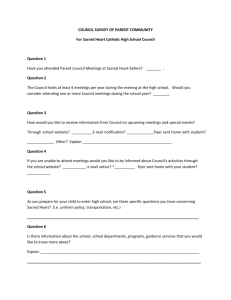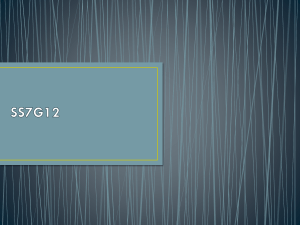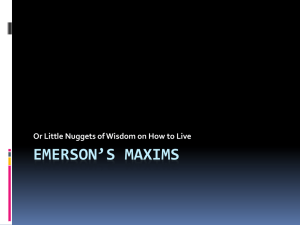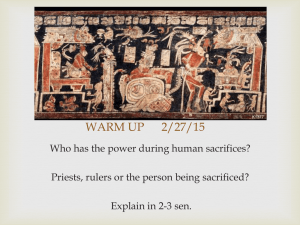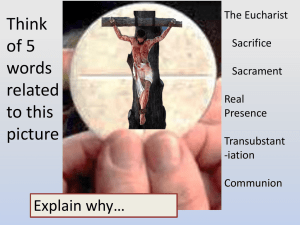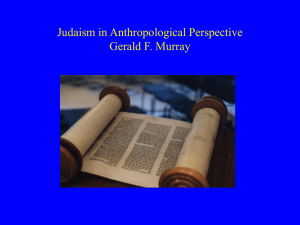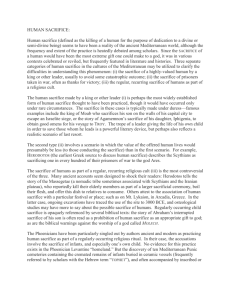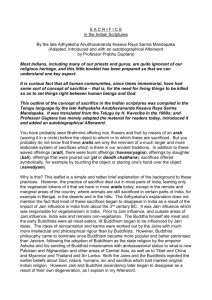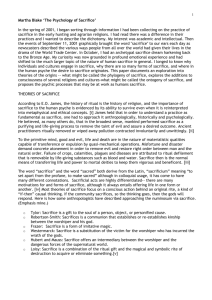`literature_and_the_great_sacrifice\`_(final)
advertisement
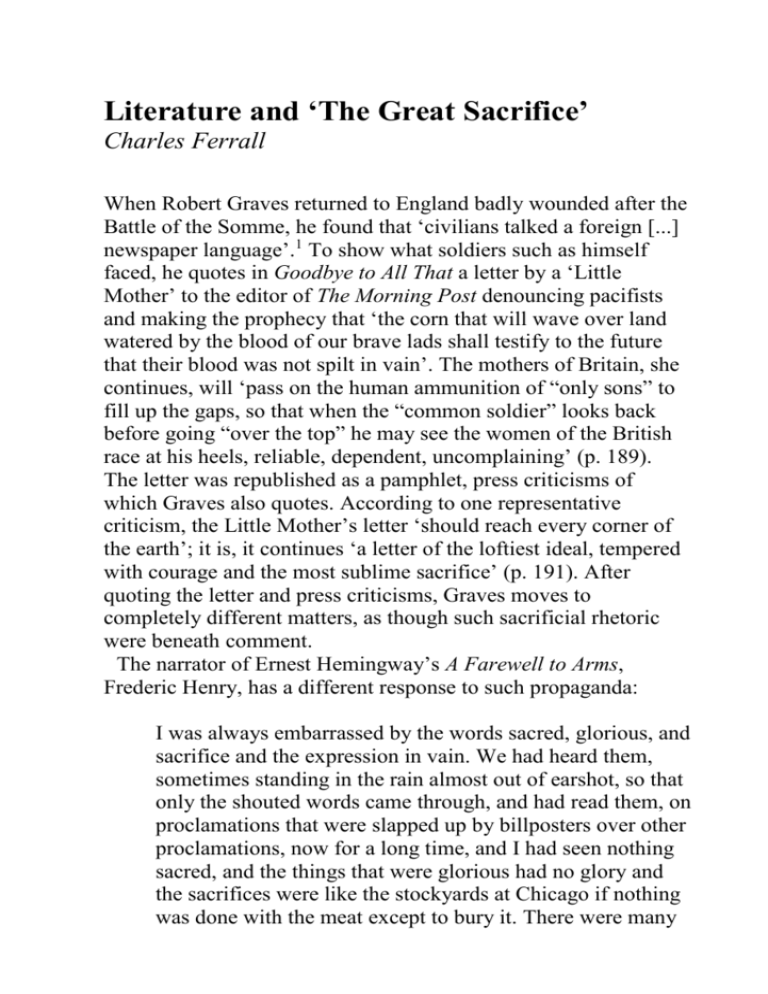
Literature and ‘The Great Sacrifice’ Charles Ferrall When Robert Graves returned to England badly wounded after the Battle of the Somme, he found that ‘civilians talked a foreign [...] newspaper language’.1 To show what soldiers such as himself faced, he quotes in Goodbye to All That a letter by a ‘Little Mother’ to the editor of The Morning Post denouncing pacifists and making the prophecy that ‘the corn that will wave over land watered by the blood of our brave lads shall testify to the future that their blood was not spilt in vain’. The mothers of Britain, she continues, will ‘pass on the human ammunition of “only sons” to fill up the gaps, so that when the “common soldier” looks back before going “over the top” he may see the women of the British race at his heels, reliable, dependent, uncomplaining’ (p. 189). The letter was republished as a pamphlet, press criticisms of which Graves also quotes. According to one representative criticism, the Little Mother’s letter ‘should reach every corner of the earth’; it is, it continues ‘a letter of the loftiest ideal, tempered with courage and the most sublime sacrifice’ (p. 191). After quoting the letter and press criticisms, Graves moves to completely different matters, as though such sacrificial rhetoric were beneath comment. The narrator of Ernest Hemingway’s A Farewell to Arms, Frederic Henry, has a different response to such propaganda: I was always embarrassed by the words sacred, glorious, and sacrifice and the expression in vain. We had heard them, sometimes standing in the rain almost out of earshot, so that only the shouted words came through, and had read them, on proclamations that were slapped up by billposters over other proclamations, now for a long time, and I had seen nothing sacred, and the things that were glorious had no glory and the sacrifices were like the stockyards at Chicago if nothing was done with the meat except to bury it. There were many Critical Studies 2 ________________________________________________________________________________ words that you could not stand to hear and finally only the names of places had dignity. Certain numbers were the same and certain dates and these with the names of the places were all you could say and have them mean anything. Abstract words such as glory, honour, courage, or hallow were obscene beside the concrete names of villages, the numbers of roads, the names of rivers, the numbers of regiments and the dates.2 Where Graves’s response is contemptuous silence, Henry’s often quoted declaration represents the kind of nominalism that for many literary critics is at the heart of modernist and post-war writing in general. But for all their hostility towards such nationalist rhetoric, many modernist or avant-garde writers retained an interest in sacrifice. Georges Bataille searched for a human being who would volunteer to be surreally sacrificed at the carefully chosen venue of the Place de la Concorde – needless to say in vain. D. H. Lawrence, who hated the war intensely from its very beginning, wrote a short story in 1924, ‘The Woman Who Rode Away’, about a white middle class woman who ecstatically welcomes her ritual killing by Mexican Indians. The story was published in the Dial, T. S. Eliot’s Criterion and an anthology called, significantly, The Best British Stories of 1926. These are certainly extreme examples but even such canonical texts as Eliot’s The Waste Land, Yeats’s more political poems, and Hemingway’s For Whom the Bell Tolls are at least ambivalent towards the sacrificial. More importantly, amongst the general reading public, notions of nationalist sacrifice were not necessarily dissipated after the bloodbaths of 1915 and 1916. The English Adonis of August 1914, Rupert Brooke, for example, was far more popular after the war than any of the other war poets, let alone the modernists. Many on the political Left during the 1930s embraced the Spanish Republican cause with an enthusiasm that owed much to the fact they had been too young to fight in the Great War. As Cyril Connolly pointed out, the war had its ‘Rupert Brooke period’, the Critical Studies 3 ________________________________________________________________________________ Left, according to George Orwell, swinging from ‘“War is Hell” to “War is glorious” not only with no sense of incongruity but almost without any intervening stage’.3 And the monuments and shrines of remembrance erected all around the world commemorated the sacrifices of the fallen or those who gave their lives thereby refashioning, according George Mosse, ‘the memory of the war […] into a sacred experience which provided the nation with a new depth of religious feeling, putting at its disposal everpresent saints and martyrs, places of worship, and a heritage to emulate’.4 If such sentiments could be expressed while memories of the carnage were still pressing and in the presence of thousands of mutilated returned soldiers, they cannot have been only the empty abstractions so impatiently dismissed by many literary historians. Such sacrificial rhetoric needs to be understood in its own terms, as something that is different in significant ways from ritual sacrifice but that nevertheless has much in common with it. To understand the patriotic effervescence of August 1914 we need to take seriously the sentiments of those under its sway that it was a form of sacrifice. It was propaganda, but it was not just that. Moreover, we need to consider the role that literature played in that catastrophe. In the best known poem about the war, ‘Dulce et Decorum Est’, Wilfred Owen bitterly rejects the source of such sacrificial ideology, the classical education that the officer class received at their public schools. As Paul Fussell points out, it was a very literary war.5 But rather than dismissing the literature of the pre-war and early war period as untouched by the experience of war and therefore remote from reality, it needs to be read as something which spoke to very real and powerful desires. Like the religion or quasi-religion of nationalism that it invoked, it may have been an illusion but it was not one easily dispelled. Given his suffering it is understandable that someone like Graves should be so contemptuous; but for anyone who wants to understand the causes of the war this is not an available response. Elsewhere Anna Jackson and I have drawn upon Marcel Mauss Critical Studies 4 ________________________________________________________________________________ and Henri Hubert’s Sacrifice: Its Nature and Function (1898) to explain the phenomenon of war as a form of sacrifice. According to them sacrifice is ‘a means of communication between the sacred and the profane world through the mediation of a victim, that is, of a thing that in the course of the ceremony is destroyed’.6 Since the sacred is ambivalent, both a source of life and death, Mauss and Hubert argue that there are therefore two fundamental forms of sacrifice: desacralisation, in which the destruction of the victim allows for the profane to be made sacred; and sacralisation, in which such destruction keeps the profane world safe from the negative forces of the sacred. We argue that the former is a form of exchange in which something valuable is given up in order to be made sacred, and that the latter is a form of substitution in which the victim takes the place of the sacrificer. Incidentally we can also regard these two processes as corresponding to Roman Jakobson’s celebrated distinction between metaphor and metonymy: in sacralisation the gift resembles the sacrificer whereas in desacralisation the victim or substitute is contiguous to the sacrificer. Mauss and Hubert’s analysis is of ritual sacrifice. However, Jackson and I argue that there are two main conditions that allow it to be displaced into warfare, aside from the fact that the latter, like ritual sacrifice, is one of the few forms of violence in society that is valorised. Firstly, the nation must be constituted as a kind of substitute or alternative religion, something which was probably first proposed by Rousseau in the penultimate chapter of The Social Contract where he argues that nations require a ‘civil religion’, something that requires both ‘martyrdom’ and ‘public execration’.7 Secondly, whereas Horace’s ‘dulce et decorum est pro patria mori’ suggests that sacred wars are hardly just a modern phenomenon, it was not until the end of the eighteenth century that citizen armies replaced armies consisting largely of mercenaries. As a consequence ordinary soldiers, not just the aristocratic few, could die for their nation. As George Mosse points out, the cult of the unknown soldier is a relatively recent historical phenomenon. Critical Studies 5 ________________________________________________________________________________ By the turn of the nineteenth century it is clear that the two opposed and dominant aspects of the literary field, realism and aestheticism, are fundamentally opposed to such forms of sacrifice. In the realist or, later, naturalist novel the implied author does not speak on behalf of society, unlike the sacrificer; the hero or heroine, whether it be a Jane Eyre, Tess Durbeyfield or any of Zola’s heroes and heroines, is a generally sympathetic figure rather than some kind of scapegoat; and the hero or heroine is seen as a victim not of an angry god but of social forces. Similarly, in aestheticism, the aesthete is a critic of or rebel against social mores; he does not give up pleasures but receives them; and instead of receiving the sacred he renounces conventional religion, hence like Baudelaire sometimes adopting various diabolic guises. Just as realism in the form of naturalism is at its most heightened towards the end of the nineteenth century, so the various aesthetic movements are most prominent during the 1890s. There might be some waning of these tendencies in the decade leading up to World War I, notably for the latter after Wilde’s trials, but literary culture during the Edwardian period can be described as radically bifurcated between realism and aestheticism, two aspects that Joyce brings back together in Ulysses. It is often said that towards the end of the nineteenth century art becomes a kind of substitute religion, but if it does the emphasis should be placed as much on its difference from as similarity to religion or the sacred. But as the nineteenth century nears its end there is an increasing division between high and popular forms of literature, and for the latter decadence is frequently what must be cleansed from society. In such pre-war invasion narratives as Le Queux’s The Invasion of 1910 (1906) a decadent because militarily unprepared England is invaded by a German-speaking enemy. While Edgar Allan Poe is usually considered the inventor of detective fiction, the genre begins to flourish during the last two decades of the century, and it is sometimes remarked that the genre resembles scapegoating rites. Dracula (1897) is more sophisticated than many of the popular gothic texts of its time, but Bram Stoker’s vampire, and perhaps most vampires, perform a literally bloodthirsty ritual that Critical Studies 6 ________________________________________________________________________________ is a demonic parody of the communion practices that are so common in rites of sacralisation, and which therefore requires the purifying act of desacralisation. In H. G. Wells’s scientific romances there are no rites of desacralisation, in part because nothing can be done to halt the eventual degeneration of humanity or, alternatively, the progress that will gradually eradicate such degeneration, but his Martians, Morlocks and Eloi strongly resemble the victims of desacralising discourse. Much of this literature takes on a scientific stance, as does Max Nordau in his extremely influential Degeneration (1892), a text which partly informs notions of degeneration in these popular genres. According to Nordau modern art, whether realist or aesthetic, is one of the main symptoms of degeneration, and yet he is so obsessed with describing all its forms of degeneracy, tirelessly producing what George Bernard Shaw called ‘two hundred and sixty thousand mortal words, saying the same thing over and over’ that the eradication of modern art in the name of science proposed in its concluding pages becomes a cure for degeneration.8 Nordau reverses cause and effect, modern art becoming not the effect of some social malady but the cause of a virtually demonic force. As such while his remedy poses as a form of science it is in fact a kind of displaced desacralisation. The monsters of this popular fiction can be seen as manifestations of the competitive and destructive forces of capitalism undergoing a new phase. This so-called second industrial revolution, perhaps best epitomised by Taylorism, produced the kind of disenchantment which Max Weber claimed was characteristic of rationalised, secularised and bureaucratised modernity. As degeneration required desacralisation, so the disenchanted modern world required some kind of sacralisation. One remedy for disenchantment or anomie was the late nineteenth century cult of adolescence and juvenile fiction. Following the Education Act of 1870 elementary school attendance trebled and by the outbreak of the War 15 per cent of the book trade was for juvenile readers, the best known of the boys’ magazines, The Boys’ Own Paper, achieving a readership of more than 1.4 Critical Studies 7 ________________________________________________________________________________ million.9 Writers of adventure stories for more mature readers such as Robert Louis Stevenson, Rider Haggard and Conan Doyle were also extremely popular, though as Conan Doyle’s dedication of The Lost World ‘to the boy who’s half a man, / Or the man who’s half a boy’ indicates, the distinction between the juvenile and mature reader was not always made.10 Drawing homologies between these romances and sacralisation can be strained. Nevertheless the contrast between the quotidian world that these boy-men escape and the exotic locations to which they travel has similarities to the profane/sacred opposition, and there is nearly always a crucial moment when they are required to sacrifice their own self-interest for some larger good. Perhaps the best known of such moments is Peter Pan’s ‘to die would be an awfully big adventure’, a line invariably quoted in the context of the War, though Barrie expresses a radical ambivalence to the sacrificial adolescence that he has come to epitomise.11 There are similar forms of displaced sacralisation in the poetry of the period. The heroic ballads and patriotic lyrics of those such as Alfred Austin, Henry Newbolt, William Watson and Alfred Noyes often address the kinds of abstractions that those such as Pound and Yeats warned against even before the outbreak of the War, just as their Romantic predecessors had criticised the personified abstractions of eighteenth century poetry. If as Northrop Frye argues ‘the central expression of metaphor is the “god”, the being who, as sun/-god, war-god, sea-god, or whatever, identifies a form of personality with an aspect of nature’, then abstractions such as duty, honour and nation can be described as dead metaphors.12 But these poets were popular and George Orwell’s notion of ‘good bad poetry’ can certainly be applied to a poem such as Sir Henry Newbolt’s ‘Vitai Lampada’ with its infamous chorus: ‘“Play up! play up! and play the game!’”13 The poems in Rupert Brooke’s 1914 and Other Poems are of greater literary merit but even then some of their more memorable lines are indistinguishable from the sacrificial. There is, of course: If I should die, think only this of me: Critical Studies 8 ________________________________________________________________________________ That there’s some corner of a foreign field That is for ever England14 which is notable for its nationalist pantheism, but also the octave of his sonnet ‘Peace’ in which the urge to sacralise and desacralise are inseparable: Now, God be thanked Who has matched us with His hour, And caught our youth, and wakened us from sleeping, With hand made sure, clear eye, and sharpened power, To turn, as swimmers into cleanness leaping, Glad from a world grown old and cold and weary, Leave the sick hearts that honour could not move, And half-men, and their dirty songs and dreary, And all the little emptiness of love!15 In a manifesto published in The Times on 18 September 1914, fifty-two British writers, among them Wells, Kipling, Chesterton, Conan Doyle and Galsworthy, called for a war in the defence of ‘civilisation’.16 We are accustomed to think of the literary as being opposed to war, and certainly the distinction I have been drawing between sacrifice and the modes of realism and aestheticism would suggest that that is the case. But just as these writers were given over to propaganda so, curiously, the favoured writers of American soldiers during the invasion of Iraq were the war poets of World War I. Literature can be a substitute for war, that is, something which replaces or opposes war, but it is also a medium of war. Victoria University of Wellington, NZ NOTES 1 Robert Graves, Goodbye to All That (Harmondsworth: Penguin, 1960), p. 188. 2 Ernest Hemingway, A Farewell to Arms (London: Vintage, 1999), p. Critical Studies 9 ________________________________________________________________________________ 165. 3 Samuel Hynes, The Auden Generation: Literature and Politics in England in the 1930s (London: Bodley Head, 1976), p. 242. 4 George L. Mosse, Fallen Soldiers: Reshaping the Memory of the World Wars (New York: Oxford University Press, 1990), p. 7. 5 Paul Fussell, The Great War and Modern Memory (New York: Oxford University Press, 1975), pp. 155–90. 6 Henri Hubert and Marcel Mauss, Sacrifice: Its Nature and Function, trans. by W. D. Halls. (London: Cohen and West, 1964), p. 97. 7 Jean-Jacques Rousseau, The Social Contract and Discourses, trans. by G. D. H. Cole (London: J. M. Dent, 1973), pp. 272-73. 8 George Bernard Shaw, ‘The Sanity of Art’, The Works of Bernard Shaw, vol. 19 (London: Constable, 1930), pp. 293–346 (p. 303). 9 Charles Ferrall and Anna Jackson, Juvenile Literature and British Society, 1850–1950: The Age of Adolescence (New York: Routledge, 2010), p. 5. 10 Arthur Conan Doyle, The Lost World and the Poison Belt (London: Eyre & Spottiswoode, 1950). 11 J. M. Barrie, The Plays of J. M. Barrie, vol. 1 (London: Hodder and Stoughton, 1931), p. 59. 12 Northrop Frye, The Great Code: The Bible and Literature (Harmondsworth: Penguin, 1990), p. 7. 13 Sir Henry Newbolt, Collected Poems 1897–1907 (London: Nelson, 1910), p. 132; ‘Rudyard Kipling’, The Collected Essays, Journalism and Letters of George Orwell, ed. by Sonia Orwell and Ian Angus, vol. 3 (London: Secker & Warburg, 1968), p. 194. 14 Rupert Brooke, 1914 and Other Poems (London: Faber, 1941), p. 15. Ibid., p. 11. 16 Christophe Prochasson, ‘Intellectuals and Writers’, in A Companion to World War I, ed. by John Horne (Oxford: Blackwell, 2012), p. 323. 15

